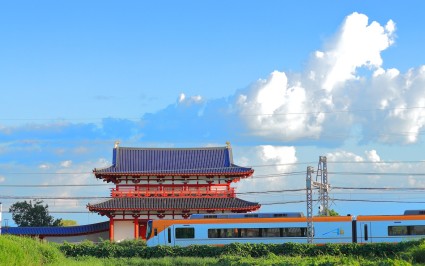China last week reported it had entered deflation for the first time since 2021 -- the latest indicator pointing to a slowdown in the world's second-largest economy.
Here's how Beijing is attempting to reverse the downturn:
Targeted stimulus
During the global financial crisis of the late 2000s, China unveiled a massive four trillion yuan ($556 billion at current exchange rates) stimulus plan.
The plan sparked an infrastructure boom of roads, airports and high-speed train lines -- but also brought the risk of unnecessary projects and growing debt.
These days, keen to clean up its finances, Beijing now prefers targeted measures to a massive, costly stimulus plan, according to Larry Hu, economist at Macquarie.
In July, the government unveiled measures to encourage the purchase of electric vehicles and household appliances.
Sluggish consumption
China has in recent weeks announced a series of measures to boost consumption, including large-scale festivals and sporting events, as well as an increase in spending on services involving catering and healthcare.
But this doesn't tackle the root of the problem, according to analysts at Trivium, a China-focused research firm.
"Consumers aren't spending because income growth has slowed and the economic outlook remains uncertain," Trivium analysts wrote in a note.
The country's post-Covid recovery is running out of steam, with one in five young people unemployed and households tightening their belts.
"Until these two issues are addressed, consumption will not pick up in a meaningful way," the analysts wrote.
Deflationary spiral
While on paper falling prices may seem like a good thing for purchasing power, a drop into deflation poses a long-term threat.
Instead of spending, consumers postpone purchases in the hope of lower prices.
And in the absence of demand, companies cut back on production, freeze hiring or lay off staff and agree to further price cuts to clear their inventories, which weighs on profitability as their costs remain the same.
In the current economic climate, households will remain "cautious about making purchases of big-ticket items given the potential risks of job losses and salary cut", according to Ken Cheung, analyst at Mizuho Bank.
Property crisis
Bricks and mortar are a pillar of the economy in a country where property has long been seen as a safe bet for middle class Chinese seeking to grow their wealth.
Yet financial woes at a large number of developers, many of whom are now struggling to stay afloat, are fueling a crisis of confidence among potential buyers and depressing prices.
The central bank has extended its support for developers until the end of 2024 and extended loan repayments to enable developers to complete existing projects.
Several cities, including Zhengzhou in central China, have also relaxed purchasing rules to stimulate demand.
But the results may fall short of expectations, warns Nomura bank analyst Ting Lu, who pointed to a "weak confidence about the future" and "falling population" as drivers of a decline in housing demand.
Trade under threat
China, long described as "the workshop of the world", remains highly dependent on exports.
The threat of recession in the United States and Europe, combined with galloping inflation, has weakened international demand for Chinese products.
In July, exports fell 14.5 percent year-on-year -- the biggest drop in more than three years.
To support the export sector, Beijing could allow the yuan to depreciate against the dollar, according to Mizuho's Cheung.
This strategy, which China has used in the past, would technically make the cost of its goods more competitive abroad.
Geopolitical tensions
Some Western leaders are advocating "decoupling" from China's economy amid tensions with Beijing.
The Chinese government's "increasingly authoritarian efforts to control Chinese society and draconian legislation like the updated anti-espionage law have also greatly eroded domestic and foreign confidence in doing business in China," according to US-based consultancy SinoInsider.
A revised law dramatically expanding China's definition of espionage came into force in July, prompting experts to warn that even companies with tenuous links to organizations accused of spying could get swept up in crackdowns.
Foreign direct investment in China fell to its lowest level since 1998 in the second quarter, according to Goldman Sachs.
"Beijing has few good options for rescuing the economy," SinoInsider analysts wrote in a note.
© 2023 AFP















15 Comments
Login to comment
quercetum
People are different and so have different views. Why acknowledge that cultural differences but claim someone's way of thinking is wrong? Different ways of thinking lead to different actions taken.
In China banking is different, debt is different, asset valuation are treated differently. Those who find it difficult to comprehend and are not inclined to think critically will dismiss this a Communism. Try and see it from a non- Western perspective.
China's entire domestic system is Chinese, and it's not based on Western Principles. Take the simple example of Non Performing Assets. The US and other countries write off Non Performing Assets by replacing them with Shareholder Capital (USA).
So as you write off more loans, you simply re-capitalise your banks and pay from the banks capital towards the written off loans. China is entirely opposite.
China diverts all non-performing loans into a separate entity and ensures that the bad debts are settled with the borrowers in many ways and reduced over years. Take the hit little by little. Cushion the fall. So obviously bad debts remain high.
Yet in reality China is actually closing bad debts with real money. The US is merely creating money to close bad debts, provide recapitalization or reissue of shares.
Chinese value assets are also based on real value. If a bank values Land for 100 Million RMB in 2007, the Land is still 100 Million RMB in 2017 even though the value of the land may actually be 300 Million RMB.
So when the bank says the debt against the Land is 85 Million RMB and that the collateral is 85% leveraged , in reality it is actually less than 30% leveraged.
Whereas in US, they value the present market value so when someone says 85% of an asset is leveraged, it's drastically different from that in China.
So frankly the Chinese trillions of dollar economy grows at 6.35 a quarter and 5% a year, which is pretty decent even by Western standards, it is actually much stronger by Chinese Standards.
If the commentators here understand how Chinese value things, he would realize China is already far stronger economy wise than many nations. Add up the numbers, 5% versus of the second largest economy versus 2% of the largest economy.
If you think their government must be wrong and invariably will fail, they are not the USSR or Russia in the 90's. It's your thinking that they are wrong that is wrong.
quercetum
To help you understand this writing and choice of words, it is equivalent to saying someone will be hospitalized for months when the person just needs an aspirin.
Deflation happens when your economy is developed and goes into stagnancy. Norway, Denmark, and Japan are nations that have seen deflation.
No nation in the history of the modern world has gone into deflation with a growth of 6.3% a quarter or 5% a year. The highest GDP of a nation that went into deflation was 1.1% which was Japan and the lowest was -0.7% which was Norway.
A nation that grows at 6.3% or 5% means that within the economy, value is growing, and deflation means value is falling. They are diametric opposites.
Developing nations don't go through deflation. The way developing nations see deflation is by a sudden huge loss of population due to war or migration in the millions.
So what's going on is that the CPI of China fell by -0.3% from July 2022. That's all. That is not even the definition of deflation. Deflation needs a minimum 8 Quarters or 2 Years. Even if China has a negative CPI every quarter, it won't be until August 2025 that you can call it deflation.
GBR48
A deflationary spiral is better than an inflationary spiral. Be careful what you wish for.
Property is big in China, so negative equity is going to be really brutal. The eye-watering debts of some of the property companies are going to be a problem.
Trade under threat. China will have to face off with the US, or Washington will simply isolate it using trade blocks.
Quote: increasingly authoritarian efforts to control Chinese society...
Complete BS. The US and EU have traded and allied with murderous and brutal dictators whenever there was something in it for them. They are simply using this to initiate a new Cold War to protect their creaking economies.
The two things that MAG in the 20thC, uber alles, were WWII and the Cold War. Having an external enemy is the only thing that might dampen America's internal political divisions. Trashing the RotW again in a new World War would MAGA in the view of both US parties. Given climate change and weapons tech, especially hypersonic and bio, it probably wouldn't work so well this time round, but politicians do like to fall back on what once worked for them.
China's biggest problem may be internal domestic economic issues and the trouble they may cause. A bit of popular aggro ended their Covid Zero policy. Xi is embracing ideological policies with the zeal of a true believer, but the newly consumerised Chinese public will not cheerfully return to being penniless labourers for the glory of Communism. There must be some factional splits in the CCP. Things may get interesting.
Desert Tortoise
The long term trend for US companies is to move at least some of their operations out of China.
https://economictimes.indiatimes.com/small-biz/trade/exports/insights/us-imports-of-chinese-goods-decline-to-lowest-levels/articleshow/100810383.cms
Desert Tortoise
This is an interesting analysis of US exports to China.
https://www.piie.com/blogs/realtime-economics/five-years-trade-war-china-continues-its-slow-decoupling-us-exports
Desert Tortoise
Or not. As prices decline and buyers put off purchases with the expectation of lower prices in the future, firm's revenues decline leading to layoffs, reduction in work hours and wage cuts. The overall effect of a deflationary spiral are falling wages and prices.
What does not decline are outstanding loan balances. Banks still expect their loan payments. That puts increasing pressure on both businesses and home owners / consumers with outstanding debt as more of their declining income goes to loan payments.
This can only last so long before the snowball of mass bankruptcy starts rolling. No economist really knows where the bottom is in a fully developed deflationary death spiral, but the resulting human suffering is very real and rivaled perhaps only by the suffering of war.
TokyoLiving
Even with its problems, China's economic keeps stronger than the whole decadent west..
GO CHINA TO THE TOP OF THE WORLD!!!..
lincolnman
Expect more military provocations towards Taiwan and the Philippines as Xi and the CCP try to deflect from China's cratering economy...
Faux nationalism is the tired and true card that authoritarians play when everything else around them is crumbling...
There's a fundamental weakness and insecurity about a regime that is so afraid of a cartoon character like Winnie the Pooh that it outlaws it...
isabelle
China could've been in a good position if it weren't for Xi. He has ruined everything for the Chinese people. There's an interesting article in the UK Guardian today about how badly he's done:
https://www.theguardian.com/world/commentisfree/2023/aug/13/putin-and-xi-are-the-laurel-and-hardy-of-statesmen-but-its-no-laughing-matter
Rule by fear has consequences. China’s exports and imports, domestic retail sales, private and foreign investment, youth employment and GDP are all cratering. China’s property market is a destabilising, bottomless hole of debt. Consumer and business confidence is shot.
Truth is, a surprisingly insecure, misguided but apparently unchallengeable Xi has brought all this down on China’s head through his dictator’s determination to dominate.
And the article links to another interesting piece from before he came to power. Just look at the difference now he's had 10 years in charge:
https://www.theguardian.com/business/2010/aug/16/chinese-economic-boom
Earlier this year, PricewaterhouseCoopers (PWC) said that a "seismic change" was underway in the world economy and that China would catch America by 2020
quercetum
garbage is not worth reading. If you need to read to find out how well a country's economy is doing instead of looking up the numbers yourself or you are not sure what the indicators are, then you can't think for yourself or form your own opinion on the China's economy.
Xi is holding things together and very level headed. He's the reason there is peace. China has not fought in a war and is not going to invade Taiwan on Xi's watch.
isabelle
If we were talking about a different country you may have a point. But this is China, where the government fabricates its statistics for political reasons.
For China, it's better to look at how the people are actually living their lives, rather than how the government wants people to think they're living their lives. This is what decent journalists do. And the people are suffering: that's very obvious from things like social media, even with the government's censorship.
Strangerland
It's true. China does often release numbers, but so many of them are fake, it's hard to trust any of them. The CCP runs an opaque government, not a transparent one. They ensure all media has the correct ideological spin to it.
Like Russia.
quercetum
I’m going to explain why debt in China is not the same debt in the West.
In China, banking is different, debt is different, and asset valuation are treated differently.
China's entire domestic system is Chinese, and it's not based on Western principles. Take the example of Non Performing Assets. The US and other countries write off Non Performing Assets by replacing them with Shareholder Capital.
So as you write off more loans, you simply re-capitalise your banks and pay from the banks capital towards the written off loans. China is entirely opposite.
China diverts all non-performing loans into a separate entity and ensures that the bad debts are settled with the borrowers in many ways and reduced over years. This is actually helping the debtor to take responsibility to square up and not fall into debt which is a Western Christian principle.
In reality China is actually closing bad debts with real money. The US is merely creating money to close bad debts, provide recapitalization or reissue of shares.
Have you ever not felt the banks should take responsibility, even if some, in the 2008 global financial crisis or the Lehman Shock as it is called in Japan? The CPC would not ever let bankers off so easily. The CPC actually protects the people where in the US, it’s obvious the Corporations that are being protected.
It must be remembered that China’s economic results over the past 3 years have not been inflated by massive covid stimuli. Instead, the covid lockdowns, one of the world’s strictest and longest, were used to enforce discipline on several problem sectors, such as education, big tech and of course, and especially real estate. The real estate market is being bled down, while big tech will be regulated, especially the shadow banking portion, and privacy protection.
Two things can cause the decline of the Chinese Economy today and they are not the ones above.
Accelerating development of China to push their middle class to 2/3.
Huge population reduction (At the rate of maybe 15–20 Million a year for 15 years) by 300 Million or so in a very short period of time.
What the US desires, will actually help China. War will enhance the Chinese Economy.
Its producer and manufacturer and industrial growth will surge massively and unemployment will be less than 2% instead of 5.5%.
An invasion of Taiwan will only cripple the West like it's being done in Ukraine while Russia is growing and laughing.
Why would you want the decline of China? China is a huge market for Corporate America.
Most of the Anti-China sentiment is because China sells everyone everything but its markets do not buy too many finished western products barring high quality ones
The Main complaint against China is that
I buy your cars, smartphones, laptops, machinery and legacy chips and electronics but you keep paying me less and less for my core technologies and developing your own.
John Deere once sold 3.4 Million Units in China and everyone was happy
Today?
231,000 Units because Chinese Brands have taken over that sector.
A long time ago, HP, Apple, Toshiba and IBM and Dell combined once sold 91% of all Laptops in China
Today they sell 62% only because almost 30% has been captured by Lenovo and Redmi and other brands
That's why everyone is angry
Still the Chinese Economy is responsible for 31% of the World's Exports from other countries
That's almost $8.5 Trillion
For a comparison, that's higher than the entire South Asia and South East Asia ($ 8.48 Trillion)
So damaging the Chinese Economy will mean a devastating impact on your own economy and a surplus glut of products and at least 6 million jobs in the Global market gone.
The Guardian will keep writing nonsense about China's economy and satisfy its readers.
Strangerland
I predicted somewhere around 2012 or 2013 that China's economy would eventually have a major collapse, due to China's excellent ability to create a beautiful facade, while ignoring the strong foundation required to make it permanent underneath. It's why their governments have always been filled with corruption. When I came to this realization, our company started our exit from doing business in China. I didn't know when it would happen - I'm not knowledgeable enough to know that - but I could see it was an inevitability.
I'm not sure they're at that point yet, as the CCP has an excellent ability to recover and maintain, as full authoritarian control allows for drastic moves that could not happen in democracies, that can quickly take care of small and even moderately large issues. But eventually the cracks in the foundation will fracture in too many places at once, the CCP will not be able to manage the narrative, and the thing about facts is that they tell the truth even when the narrative doesn't. With the narrative of the CCP not able to cover the reality of the situation, the rest of the world will acknowledge the reality, and the Chinese economy will collapse as a result.
I don't know when this will happen - could be next week, could be 30 years from now. But authoritarianism is built on a weak foundation, and without a strong foundation, everything eventually collapses.
quercetum
True and well said. The issue is corruption. I have no problems with a benevolent authoritarian emperor or party or government.
Authoritarianism versus a Representative Democracy and Western Capitalism has been overemphasized.
Between 1952 and 1982, Taiwan’s economic growth was on average 8.7%, and between 1983 and 1986 at 6.9%.
Until 1987 Taiwan was under a military dictatorship. It was very much authoritarian and Martial Law was only lifted then.
If a cat catches mice, it does not matter if it’s black or white.